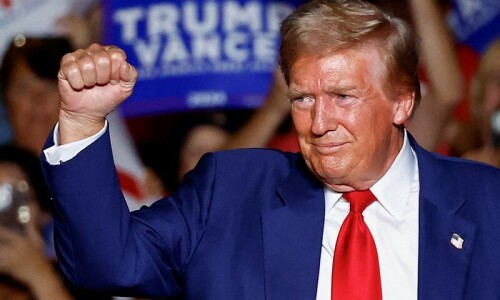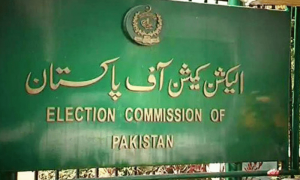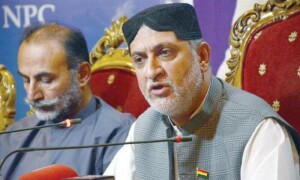ATLANTA: For black Americans, the road to political inclusion that has allowed Democratic candidate Barack Obama to make a serious bid for the White House has been long and difficult.
After the Emancipation Proclamation ended slavery in 1863, a series of laws and amendments to the US constitution allowed Hiram Revels to be elected to the senate in 1870 in Mississippi as the country’s first African American congressman.
But only a small number of black Americans have entered the US senate or become state governors since then and most of those who have found a slot on a presidential ticket had no chance of winning.
The most unlikely black American on a presidential ticket was Frederick Douglass. Born into slavery in Maryland in 1818, Douglass taught himself to read, illegal for blacks at the time, fought a slave master and was repeatedly whipped.
He escaped to New York in 1838, where he became a prominent lecturer, newspaper publisher and a spokesman for the abolition of slavery and for women’s rights.
His autobiography became a bestseller and he advised President Abraham Lincoln during the civil war and delivered a stirring eulogy at Lincoln’s funeral.
But when Victoria Woodhull ran for president for the Equal Rights Party in 1872 and named Douglass as her vice-presidential candidate, Douglass, who supported incumbent President Ulysses Grant, never acknowledged that he was on Woodhull’s ticket and never campaigned on his own behalf.
“It was a publicity stunt to generate attention to some for the issues she believed in,” said Eric Foner, a leading expert on the period.
NO VOTE: In the decades after the end of the civil war, two black Americans were elected to the US Senate before a series of laws ushered in an era of disenfranchisement, segregation and lynchings, all of which stifled black political participation.
In 1932, 1936 and 1940, James Ford, a labour organiser, ran as the Communist Party’s vice-presidential candidate. Though the party gained less than one per cent of the vote in 1932, some blacks including prominent intellectuals were attracted to its commitment to end racial discrimination as part of the drive for equality for all oppressed workers.
Until that point, most Americans would have laughed off the idea of a black presidential bid as far-fetched.
But a change started when, in the teeth of violent opposition, the civil rights movement set winning the right for blacks to vote in the South as a goal. After landmark acts in 1964 and 1965, blacks were able to vote in large numbers.
Eldridge Cleaver, a leader of the militant Black Power movement, ran for president in 1968 on a pro-civil rights, anti-Vietnam War platform. The same year, comedian and activist Dick Gregory ran for president for the Freedom and Peace Party, which had broken off from Cleaver’s Peace and Freedom Party.
That year, Charlene Mitchell, another communist, became the first African American woman on a presidential ballot she ran in two states.
Shirley Chisholm, the first black woman elected to Congress, was also the first African American to vie for a major party’s nomination, attempting to become the Democratic party’s candidate for president in 1972.
“With her, it was something of a symbolic political exercise that people, including blacks, didn’t think was possible,” said Lee Edwards, presidential historian at the Heritage Foundation, a Washington-based think-tank.
“People were not seriously thinking that Chisholm ... could become president,” Edwards said.
FINAL LAP: Rev. Jesse Jackson, who marched with Rev. Martin Luther King for civil rights, won primary elections in five states during his 1984 bid for the Democratic nomination and in at least 11 states in a repeat bid in 1988, when he was briefly considered the front-runner.
“My first run was to put the civil rights agenda, the structure of equality agenda, on the front burner,” Jackson said in an interview. “It broke a cultural barrier.”
Jackson set his own bids in the context of a process that began in 1954 with a landmark Supreme Court decision on public school desegregation that laid the groundwork for democratic equality and civil rights.
Obama was “running the final lap of a marathon” that had lasted for decades, Jackson said.
He said political access for minorities was already entrenched whether Obama won or not, an argument partly backed up by the increasing number of black Americans who have run for president in recent elections.
Activist Lenora Fulani was the first black woman to have her name on the ballot in 50 states at the 1988 election. Alan Keyes ran for the Republican nomination in 1996 and in 2000.
Rev. Al Sharpton campaigned for the Democratic nomination for the 2004 presidential election, a campaign in which Sen. Carol Moseley Braun was also briefly a candidate.
While none has matched Obama’s prominence, he is not the only black candidate in 2008. Cynthia McKinney, an African American former congresswoman from Georgia, is the Green Party’s presumptive nominee.—Reuters













































Dear visitor, the comments section is undergoing an overhaul and will return soon.